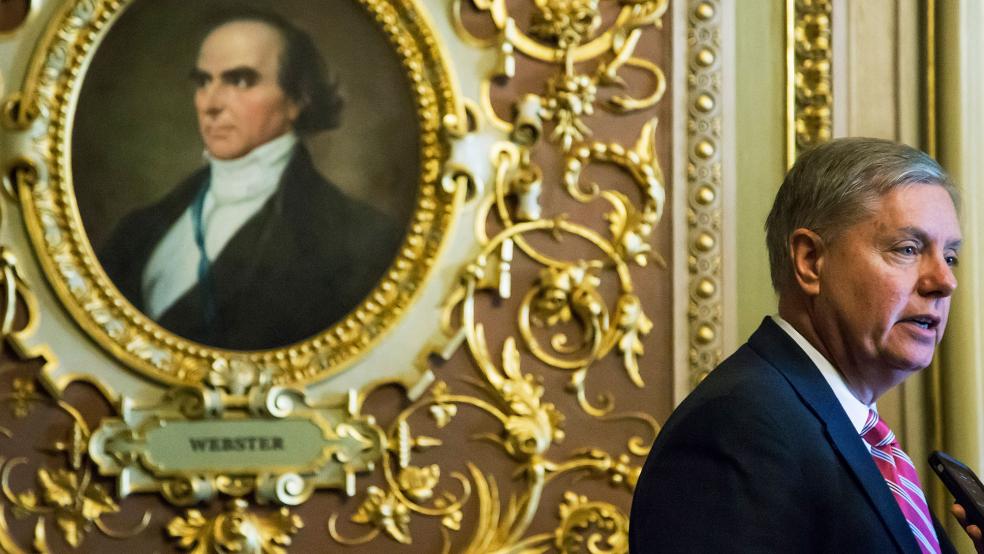In a sign that global warming and what to do about it will be on the agendas of both parties this election season, Sen. Lindsey Graham (R-SC), a staunch conservative on defense and national security matters, offered a stinging critique of the GOP’s environmental policies over the weekend.
During an appearance Sunday on CNN’s State of the Union, Graham blasted other Republican presidential candidates for sidestepping environmental issues or embracing dangerously narrow positions designed to protect business.
Related: Despite Reams of Evidence, Global Warming Ranks Low on Americans’ Worry List
“Here’s a question you need to ask everybody running as a Republican,” Graham told CNN’s Dana Bash. “What is the environmental policy of the Republican Party? When I ask that question, I get a blank stare. We don’t have an environmental policy. We have an energy policy.”
“If I’m president of the United States, we are going to address climate change and carbon dioxide emissions in a business-friendly way,” he added. “We’re going to find oil and gas that we own because we’re going to use fossil fuels for a long time to come. But it’s okay to get a lower carbon target. I do believe that climate change is real. I want a business solution to that problem.”
Graham told CNN that he “absolutely” believes that climate change is partially man-made and ridiculed doubters who argue to the contrary. “When 90 percent of the doctors tell you you got a problem, do you listen to the on [who disagrees]?” he asked.
For now at least, Graham is the lone wolf among Republican presidential candidates in both acknowledging that the problem is manmade and signaling a willingness to consider effective counter-measures.
Related: Governments Promise to Fight Global Warming While Funding King Coal
For example, Sen. Marco Rubio (R-FL) has voiced doubt as to whether “human activity” is causing dramatic changes to the climate the way many scientists are portraying it. Rubio voted against an amendment introduced by Sen. Brian Schatz (D-Hawaii) earlier this year that expressed the sense of Congress that “climate change is real” and “human activity significantly contributes” to it.
Wisconsin Gov. Scott Walker has been a key figure in the Republicans’ fight against President Obama’s signature climate policy—the proposed Environmental Protection Agency rules that are designed to reduce the carbon footprint of the nation's electricity sector 30 percent by 2030. Those rules will likely force states to retrofit or close down many of their coal-fired power plants. In a letter to the EPA last December, Walker complained that the plan would deliver a serious “blow” to Wisconsin’s residents and business owners.
Former Florida Governor Jeb Bush in the past has acknowledged that global warming “may be real” although he was uncertain about how much industry has contributed to the problem. More recently, he has said that he is “concerned about” climate change and encouraged cooperation among countries to “negotiate a way to reduce carbon emissions.”
Related: Look Who’s Worried About Global Warming Now
Graham didn’t offer any specific solutions to climate change, although he once flirted with backing a Democratic plan in the Senate to create a “cap and trade” program. That approach would gradually reduce industrial carbon emissions in part by allowing utilities and manufacturers that produce large quantities of carbon emission to purchase offsetting credits from other industries that have substantially reduced their emissions.
Another possibility would be to impose a carbon tax on industry to discourage the use of fossil fuels. A graduated carbon tax would boost the price of fossil fuels, with more taxes collected on fuels that generate more emissions, like coal. Many business leaders see the handwriting on the wall and realize that they eventually must come to terms with the fact that traditional reliance on fossil fuels for energy and production will gradually give way to a more balanced use of fossil fuels and alternative energy sources.
Just last week, the senior executives of six large European oil and gas companies – the BG Group, BP, Eni, Royal Dutch Shell, Statoil and Total – urged world leaders to call for a tax on carbon emissions, according to The New York Times. The company officials reportedly were seeking an efficient and predictable policy to limit greenhouse-gas emissions.
Related: Obama’s Budget Boosts EPA to Fight Climate Change
This approach has been proposed in the past by scientists, economists, environmentalists and some political leaders. Meanwhile, public support for tough action has been growing. A New York Times-Stanford University poll released in January showed that an overwhelming majority of Americans, including half of Republicans, favor government action to curtail global warming.
Top Reads from The Fiscal Times





